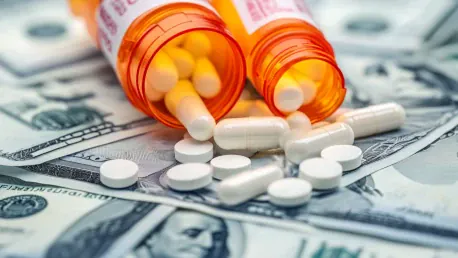As the U.S. presidential election looms, the conversation around pharmaceutical policies intensifies, with Vice President Kamala Harris and former President Donald Trump proposing divergent paths. Harris and Trump represent fundamentally different approaches to drug pricing reforms, reflecting contrasting beliefs about the role of government in healthcare. Harris supports the broad expansion of governmental negotiation powers to reduce consumer costs and improve access to essential medications. Alternatively, Trump advocates for industry-favorable policies that prioritize innovation and economic incentives for pharmaceutical companies. The decisions that voters make in the upcoming election could significantly influence the American healthcare landscape for years to come.
Differing Visions for Drug Pricing
Kamala Harris and Donald Trump offer starkly different visions for U.S. drug pricing reforms. Harris, a staunch supporter of the Inflation Reduction Act (IRA), seeks to enhance its provisions, particularly regarding Medicare’s new power to negotiate drug prices. She envisions an expansion that transcends Medicare, aiming to benefit private insurance holders as well. Alternatively, Trump, who once advocated for reducing prescription costs and Medicare negotiation, has now shifted to a more industry-friendly approach, reflecting evolving priorities in his campaign.
Harris’s policies emphasize aggressive cost reduction measures and broader governmental oversight. Her proposals include extending the benefits of the IRA to more Americans, such as universalizing the $35 monthly insulin cap and a $2,000 annual out-of-pocket maximum. In contrast, Trump’s current stance aligns more closely with pharmaceutical lobby interests, indicating a preference for market-driven solutions. These contrasting approaches highlight fundamental differences in how each candidate views the role of government in managing drug prices and healthcare costs.
The Inflation Reduction Act’s Impact
The IRA, a pivotal legislative accomplishment for the Biden administration, introduced significant changes to how Medicare can negotiate drug prices. These provisions, set to take effect in 2026, have met with staunch opposition from the pharmaceutical industry, which fears reduced incentives for drug research. Despite efforts to block these measures through legal challenges, courts have maintained the IRA’s integrity, allowing the first round of price negotiations to proceed.
Harris’s stance on the IRA is one of extension and amplification. She proposes leveraging its framework to encompass the private insurance market, thereby broadening the reach of negotiated drug prices. Additionally, Harris aims to universalize the $35 monthly insulin cap and the $2,000 annual out-of-pocket maximum, currently limited to Medicare beneficiaries, to all Americans. These measures are designed to alleviate financial burdens on patients and ensure more equitable access to essential medications.
Trump’s Shift Towards Industry-Favored Policies
Initially, Trump advocated for substantive changes to lower drug prices, including granting Medicare negotiation powers and implementing the “most-favored nations” policy to align U.S. drug prices with those paid abroad. However, his stance has since shifted. Trump no longer supports these stringent measures and has instead adopted policies that favor the pharmaceutical industry. His revised position aligns with the interests of influential lobby groups like PhRMA, which have historically opposed price-setting mechanisms.
Trump’s softened position on eliminating PBM rebates, once a crucial element of his drug pricing strategy, indicates a significant policy pivot. While his earlier proposals targeted reducing the financial strain on consumers, his current approach suggests a preference for maintaining the status quo, which is more advantageous to pharmaceutical companies. This shift has garnered mixed reactions, reflecting broader debates over balancing industry profits with patient affordability.
Harris’s Target on Pharmacy Benefit Managers
Pharmacy Benefit Managers (PBMs) play a pivotal role in the pharmaceutical supply chain, often dictating the prices paid by consumers for medications. Harris has aggressively targeted PBMs, accusing them of inflating drug costs and squeezing profits from small, independent pharmacies. Her policy plans include enhancing transparency in PBM practices and implementing regulations to curb their financial influence.
By focusing on PBMs, Harris aims to address one of the less visible, yet highly impactful, components of the drug pricing system. This move is intended to create a more equitable marketplace where consumers benefit from fair pricing, and smaller pharmacies can operate sustainably. The scrutiny of PBMs has also found some resonance with Trump’s earlier policies, although he has since deprioritized them in his current campaign.
Industry Influence and Financial Contributions
As the U.S. presidential election approaches, the debate over pharmaceutical policies heats up. Vice President Kamala Harris and former President Donald Trump propose vastly different solutions. Their stances highlight a fundamental divide in views on the government’s role in healthcare. Harris is an advocate for expanding the government’s power to negotiate drug prices, aiming to lower consumer costs and improve access to crucial medications. Her plan leans heavily on government intervention to protect consumers.
On the flip side, Trump supports policies that favor the pharmaceutical industry, stressing the importance of innovation and economic incentives for drug manufacturers. He believes that fewer regulations and more incentives will spur the research and development of new treatments. This stark contrast in approaches offers voters a clear choice about the direction they want the country to take. The outcome of this election could significantly shape the future of American healthcare, affecting everything from drug affordability to access to new treatments for years to come.









